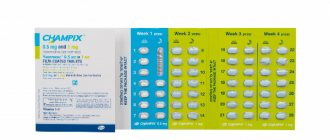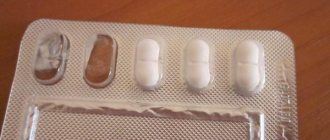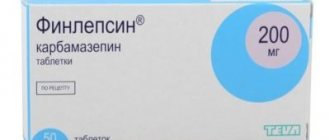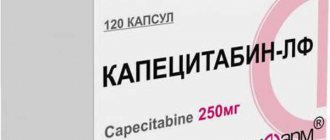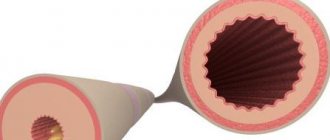Akatinol (memantine) is a voltage-dependent, noncompetitive NMDA receptor antagonist that blocks the effects of pathologically elevated glutamate levels that can lead to neuronal dysfunction. Neurologists at the Yusupov Hospital use the drug in the complex treatment of neurodegenerative dementia. Under the influence of the drug, patients’ general and emotional spheres and cognitive abilities stabilize and improve. There are no data on the use of the drug in the treatment of autism.
The medicine akatinol memantine is available in 20 mg doses. The package contains 98 tablets. Drops for oral administration contain 10 mg of memantine hydrochloride per 1 ml. D-60318, Germany, Frankfurt am Main. The drug can be bought at a pharmacy at a price of 1,680 rubles. According to the instructions for use, akatinol memantine is contraindicated for children under 18 years of age.
Dementia is a severe disorder of higher nervous activity that is caused by organic damage to the brain. The disease is manifested by a sharp decrease in mental abilities. To treat it, professors, candidates and doctors of medical sciences, doctors of the highest category of the Yusupov Hospital use the entire range of medications and non-drug methods of therapy available today. The medical staff is attentive to the wishes of patients.
Indications and contraindications
Neurologists at the Yusupov Hospital use the drug Akatinol Memantine as part of complex therapy for the following diseases:
- Alzheimer's type dementia;
- Vascular dementia;
- Mixed dementia of all degrees of severity.
The drug is contraindicated in case of individual hypersensitivity to its ingredients, severe renal dysfunction. Akatinol Memantine is not prescribed during pregnancy and lactation, or for children under 18 years of age. Doctors at the Yusupov Hospital use the drug with caution to treat patients suffering from thyrotoxicosis, epilepsy, and heart failure. Neurologists consider the balance of benefit and potential harm when prescribing akatinol memantine to patients who have had a myocardial infarction or have a history of seizures.
Indications for use
Akatinol Memantine for children, reviews of which are most often positive, is intended to correct symptoms of congenital or acquired dementia:
- disorientation in space and time;
- decreased cognitive abilities;
- lack of self-care skills;
- speech and writing disorders;
- loss of acquired skills;
- reduced memorization.
Akatinol Memantine is indicated for children with dementia
The drug can be used in a wide range of severity levels of these pathologies.
Side effects and interactions with other drugs
Akatinol (memantine) is an effective drug with a high safety profile. When using it, doctors at the neurology clinic observed the following undesirable reactions:
- Drowsiness;
- Constipation;
- Dizziness.
Rarely, patients complain of fatigue, confusion, gait disturbance, nausea and vomiting. Some patients who took akatinol (memantine) experienced hallucinations and developed venous thrombosis. If a side effect occurs, doctors at the Yusupov Hospital stop the drug and correct the resulting problems.
When used simultaneously with dopamine agonists, anticholinergics, L-dopa preparations, the effect of the latter drugs may be enhanced. Simultaneous use of akatinol (memantine) with barbiturates and neuroleptics reduces their effect. Akatinol (memantine) changes the severity of the pharmacological action of dantrolene or baclofen, so neurologists at the Yusupov Hospital select drug doses individually. Doctors at the Neurology Clinic do not prescribe akatinol (memantine) simultaneously with amantadine, dexamethorphan and ketamine. In the blood plasma, the level of cimetidine, procainamide, kinin, kinidine, nicotine may increase and the concentration of hydrochlorothiazide may decrease when taken simultaneously with memantine.
Pharmacodynamics and pharmacokinetics
Memantine hydrochloride is a derivative of adamantane in its chemical structure. The active substance selectively blocks N-methyl-D-aspartate (NMDA) glutamate receptors.
The drug normalizes the transport of ionic particles, blocks specific channels, and stabilizes membrane functions. The mechanism of pharmacological activity is associated with the launch of a glutamatergic impulse, which determines the interaction of brain parts in the head region.
After internal use, the substance is quickly absorbed in full. The highest plasma concentration is achieved after 2-6 hours. With healthy renal tissue function, accumulation in the body does not occur.
Removal is carried out in 2 phases. In phase 1, the half-life is 4-9 hours, in phase 2 – up to 65 hours. Approximately 80% of the dose taken does not undergo biochemical transformation. The remainder consists of some metabolites that have no pharmacological effect on the body.
The drug is excreted in the urine. With its alkaline reaction, the process slows down somewhat.
Method of administration, dosage and overdose of the drug
Akatinol (memantine) should be taken orally with meals. Doctors at the Yusupov Hospital set doses of the drug individually. Treatment begins with the minimum effective doses.
Adults with dementia are prescribed 5 mg of the drug per day during the first week of therapy, 10 mg per day for the second week, and 10 mg per day for the third week. If necessary, further increase the dose of the drug weekly by 10 mg until the daily dose is reached -30 mg.
In case of overdose, the severity of side effects of akatinol may increase. In this case, patients are given gastric lavage, activated charcoal is given orally, and symptomatic therapy is performed.
Akatinol Memantine, 5/10/15/20 mg, set of tablets, film-coated tablets, 28 pcs.
INSTRUCTIONS for medical use of the drug Akatinol Memantine
I APPROVED
Head of the Department of State Control of Medicines and Medical Equipment of the Ministry of Health of the Russian Federation
Approved by the Pharmacological Committee of the Ministry of Health of Russia
Chemical name:
1-amino−3,5-dimethyl-adamantane hydrochloride 3,5-dimethyl-tricyclo-(3,3,1,137)-decane−1-aminohydrochloride
Description
Film-coated tablets, cream-colored, oblong, biconvex, scored on each side. Covered with a film shell. Tablet length 12.6±0.1 mm; width 5.6±0.1 mm; height 3.7±0.1 mm.
Drops are a colorless transparent solution.
Compound
1 film-coated tablet contains: active substance - memantine hydrochloride 10 mg, excipients: lactose 174.75 mg, MCC 52.100 mg, colloidal silicon dioxide 1.25 mg, talc 11.15 mg, magnesium stearate 0.75 mg; film coating: methacrylic acid copolymer 1.446 mg, sodium lauryl sulfate 0.010 mg, polysorbate 80 0.034 mg, triacetin 0.150 mg, SE 0.01 mg, talc 0.35 mg.
1 ml of drops contains: active substance - memantine hydrochloride 10 mg, excipients: potassium sorbate 2 g, sorbitol solution 100 ml, purified water 888 ml.
Pharmacological properties
Pharmacodynamics
Memantine has a modulating effect on the glutamatergic system, being a non-competitive antagonist of N-methyl-D-aspartate (NMDA) receptors. It has a pathogenetic effect on degenerative processes in the central and peripheral nervous system. Regulates ion transport - blocks calcium channels. Has a neuroprotective effect. Normalizes membrane potential. Improves the process of nerve impulse transmission. Improves cognitive processes, memory and learning ability, increases daily activity.
Pharmacokinetics
After oral administration, Akatinol Memantine is quickly and completely absorbed. Cmax in blood plasma is achieved within 2–6 hours. With normal renal function, no accumulation of the drug was observed. Elimination occurs in two phases. T1/2 is, on average, in the first phase - 4-9 hours, in the second - 40-65 hours. It is excreted mainly by the kidneys (75-90%).
Indications
Degenerative dementia (Alzheimer's type), vascular dementia, mixed dementia of all degrees of severity. Weakening of memory, ability to concentrate, ability to learn. Cerebral and spinal spastic syndrome due to traumatic brain injury, multiple sclerosis, stroke.
Contraindications
— Individual hypersensitivity to the drug.
— Severe renal dysfunction.
- Pregnancy.
- Breast-feeding.
Prescribe with caution to patients with thyretoxicosis and epilepsy.
Side effects
Dizziness, feeling tired, anxiety, increased excitability, nausea.
Interaction
With simultaneous use of Akatinol Memantine with barbiturates, neuroleptics, and anticholinergics, the effect of the latter may be enhanced. When used together, Akatinol Memantine may change the effect of dantrolene or baclofen, so the doses of the drugs should be selected individually.
Overdose
The manifestations of the described side effects may increase.
Directions for use and doses
The dosage regimen is set individually. It is recommended to begin treatment with the administration of minimally effective doses.
Adults with dementia syndrome are prescribed a dose of 5 mg/day during the 1st week of therapy, and a dose of 10 mg/day during the 2nd week. During the 3rd week - at a dose of 15–20 mg/day. If necessary, it is possible to further increase the dose weekly by 10 mg until a daily dose of 30 mg is reached. For movement disorders caused by pathology of the central nervous system, a daily dose of 10 mg is prescribed during the 1st week of treatment, a dose of up to 10 mg/day during the 2nd week, and 20–30 mg during the 3rd week. . If necessary, it is possible to further increase the dose by 10 mg weekly until a daily dose of 60 mg is reached.
The approximate maintenance dose is 10–20 mg/day.
The daily dose is evenly divided into several doses throughout the day, the drug should be taken with meals, the last dose is recommended to be taken before dinner.
For patients with impaired renal function, the dosage regimen is set individually, depending on clinical effectiveness, under the control of renal function during treatment.
Children are prescribed a dose of 500 mcg/kg/day.
special instructions
For elderly patients, it is preferable to prescribe the drug in the form of drops. The optimal dose is achieved gradually, with the dose increasing every week.
Release form
Film-coated tablets: packs of 30 and 90 pcs.
Drops for oral administration: in bottles of 50 and 100 ml.
Storage conditions
List B.
Store at a temperature not exceeding 25°C out of the reach of children.
Best before date
Tablets - 3 years, drops - 5 years.
Conditions for dispensing from pharmacies
On prescription.
Enterprise - 60318, Germany, Frankfurt am Main
Precautions, special instructions
Doctors at the neurology clinic prescribe akatinol (memantine) with caution to patients with thyrotoxicosis or epilepsy. The optimal dose of the drug is achieved gradually, with weekly increases.
Patients with Alzheimer's disease in the stages of moderate to severe dementia usually have impaired ability to drive vehicles and operate complex machinery. Memantine may cause changes in reaction rates. For this reason, patients receiving treatment on an outpatient basis should refrain from driving vehicles and cars and take special care when working with machinery.
Akatinol Memantine is recommended to be stored at a temperature not exceeding 25 °C out of the reach of children. The drug should not be taken after the expiration date indicated on the package. Despite the high price, reviews of the drug are positive. Do I need a prescription to buy akatinol memantine at a pharmacy? The drug is available with a doctor's prescription, prescribed by neurologists at the Yusupov Hospital.
You can get detailed information about the treatment of dementia at the Yusupov Hospital using the latest medications and non-drug treatments by calling. The contact center is open 24 hours a day, seven days a week.
Reviews of use for ischemic stroke
Ischemic stroke is an urgent medical and social problem due to its widespread prevalence, high rates of disability and mortality. Neurologists of the Yusupov Hospital modern approaches to the treatment of ischemic stroke. Doctors use methods aimed at restoring blood supply to the brain during the first hours of the disease in order to restore blood flow in the affected vessel and methods to protect brain tissue. This allows you to prevent the development of irreversible damage to the brain substance or reduce its volume.
Reperfusion is carried out by administering a thrombolytic - recombinant tissue plasminogen activator. The second main direction of treatment of stroke in the acute stage is neuroprotective therapy. In ischemic and hemorrhagic stroke, neurologists use akatinol memantine as a neuroprotector. The drug can have a neuroprotective effect in global and focal cerebral ischemia.
Memantine reduces lesion volume and reduces neurological deficits after ischemic stroke. According to reviews from doctors, the administration of akatinol memantine increases survival after intracerebral hemorrhage, which often decreases with systemic thrombolysis therapy. The drug is effective as an adjuvant therapy to improve the safety of systemic thrombolysis.
Price in pharmacies in Moscow, St. Petersburg, regions
Akatinol Memantine for children, reviews of which criticize its cost, is not a budget drug. Average prices depend on the method of distribution and the immediate location of the pharmacy, and the pricing policy of the pharmacy chain.
Average prices:
- 30 tablets of 10 mg – 1900 rubles;
- 90 tablets of 10 mg – 5300 rubles;
- 28 tablets of 20 mg – 3100 rubles;
- 56 tablets of 20 mg – 6000 rubles;
- 98 tablets of 20 mg – 8900 rub.
In some cases, it is possible to receive medications containing memantine free of charge, but they must be confirmed by relevant documents and verdicts of medical commissions.
Akatinol Memantine is a functional and effective drug for treating children from a large number of pathologies. Strict adherence to the medication regimen and concomitant therapy, according to reviews, give quick and good results. In most cases, with not too serious brain damage, it is possible to completely compensate for the impairment and accelerate the child’s development.
Side effects
Actinol Memantine is a serious drug for treatment. Reviews of it often contain information about the development of unwanted side effects.
These include:
- >1/100 to <1/10 – headaches, drowsiness, digestive disorders, shortness of breath;
- >1/1000 to <1/100 – fatigue, infections, blood pressure surges;
- >1/10000 to <1/1000 – fungal infections, mental and coordination disorders, hallucinations;
- <1/10000 - convulsive phenomena.
The following side effects have been reported with unknown frequency:
- dizziness;
- excitability;
- hypertonicity;
- depression.
In addition to the effects listed, many other reactions with unknown frequency occur. To reduce the risk of their occurrence, treatment should be carried out under the strict supervision of a specialist.
Composition, release form and analogues
Akatinol is available in the form of film-coated tablets. One tablet consists of the active component memantine hydrochloride (10 mg) and the following excipients:
- Colloidal silicon dioxide;
- Lactose;
- Magnesium stearate;
- Microcrystalline cellulose;
- Talc.
The film shell of the Akatinol tablet consists of:
- Sodium lauryl sulfate;
- Methacrylic acid copolymer;
- Simethicone emulsions;
- Polysorbate 80;
- Talc;
- Triacetin.
Akatinol tablets are biconvex, scored on both sides. They have an oblong shape. Available in 10 pieces in blisters in cardboard packages.
The drug is also produced in the form of drops for oral administration (colorless transparent solution). 1 ml of solution contains 10 mg of memantine hydrochloride. Available in dark glass bottles with a pipette cap of 50 and 100 mg.
Among the analogues of Akatinol, the following drugs can be noted:
- Memantine;
- Memantine-TL;
- Memantinol;
- Memantine Canon;
- Memental;
- Memantine hydrochloride;
- Alzeim;
- Memaneurin;
- Noogeron;
- Maruxa.
